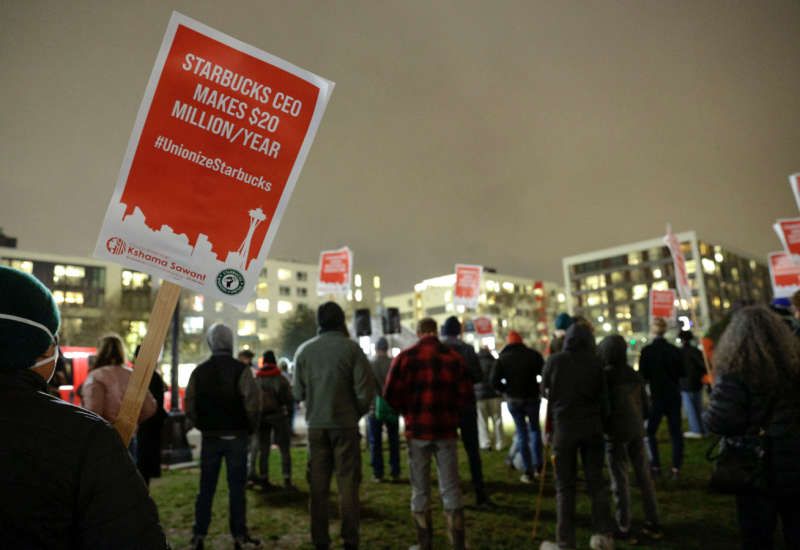On Monday, Starbucks Workers United announced that they had officially surpassed 100 locations filing for union representation, marking a milestone despite the company stepping up its union-busting efforts.
“It’s official – we reached the 100 store mark,” the union tweeted. “103 stores (to be exact) have filed petitions with the NLRB to join the Starbucks Workers United movement!”
New filings at three stores in Virginia and one store in Wisconsin pushed the count over 100, and across 26 states. Two stores have successfully unionized so far, and thousands of workers are in the middle of organizing campaigns at their stores.
According to the union, the number of stores filing for unionization has doubled over just the past three weeks; at the end of January, roughly 50 stores had filed for unionization.
“Make no mistake, we have momentum,” Lynne Fox, international president of Workers United, said in a statement. “I would welcome a conversation with [Starbucks CEO] Kevin Johnson anytime. Labor relations should be collaborative, not adversarial. There is no success without worker voices.”
The company has been increasingly hostile toward the union movement, making more desperate moves as the union movement grows. Earlier this month, the company fired seven workers in a unionizing store in Memphis, Tennessee. The fired workers comprised the store’s entire organizing committee.
Recently, the company fired a leading organizer in Buffalo, New York, where the unionization campaign started. Former Starbucks worker Cassie Fleischer was a member of the union’s bargaining committee, which is currently in negotiations with the company for the unionized Buffalo stores’ first contracts.
“As a leader in the union’s organizing and negotiations committees, and having helped organize the strike over covid-19 safety, I know something has changed,” Fleischer wrote on Facebook. “This is not the company I signed on to in 2017, and this just further proves that we need a union in our stores.”
It is illegal for a company to retaliate against workers who are exercising their right to form a union. However, unfair labor practice cases can take years for the National Labor Relations Board (NLRB) to process. Further, if the company is found to have violated the law by firing an organizing employee for no good reason, there is essentially no punishment for the company, which would only be required to rehire the employee and pay the wages for the time lost – or what would be the regular cost of operation for the company if they hadn’t fired the employee.
Last week, the company also attempted to delay a vote count for a unionizing store in Mesa, Arizona, repeating its argument that union elections shouldn’t be held on a store-by-store basis. The NLRB ruled against the company, this time because the company submitted its argument to delay the vote count too late. It’s a narrow win for the union, which is confident that the store will unionize.
“This is incredibly disappointing for us, but we know that this is just a delayed victory,” said Michelle Hejduk, shift supervisor at the organizing Mesa store, in a press conference.
The company has tried to argue against store-by-store elections before in its attempts to delay or stop elections in Mesa and Buffalo, but the NLRB has ruled against them each time.
These tactics are on top of the other union-busting moves that the company has waged within organizing stores. In Mesa, workers said that the company added five managers and many employees to the store when their union campaign started. And workers across the country have reported that the company is holding mandatory meetings and one-on-one confrontations with organizing stores in attempts to intimidate them against organizing.
The company is also attempting to leverage the contract negotiations in Buffalo against unionizing stores. It has been telling organizing employees to wait for the results of the negotiations before voting for a union – while likely knowing full well that it would drag out negotiations for years if needed.
Employees, meanwhile, are begging Starbucks to stop its union-busting campaign and return to its roots as a supposedly progressive company.


